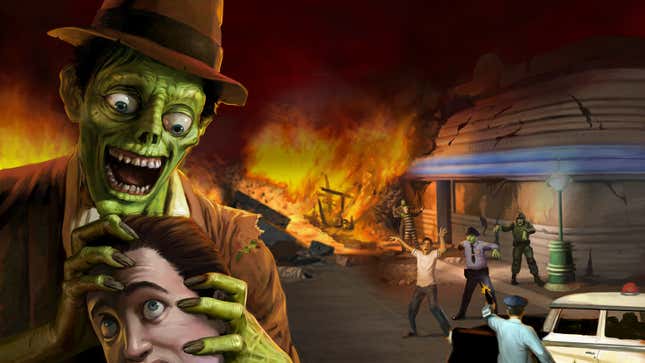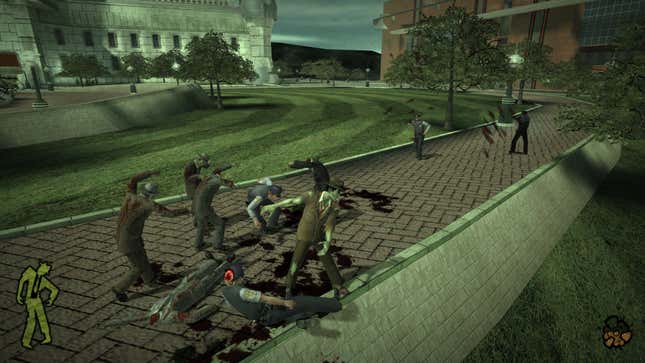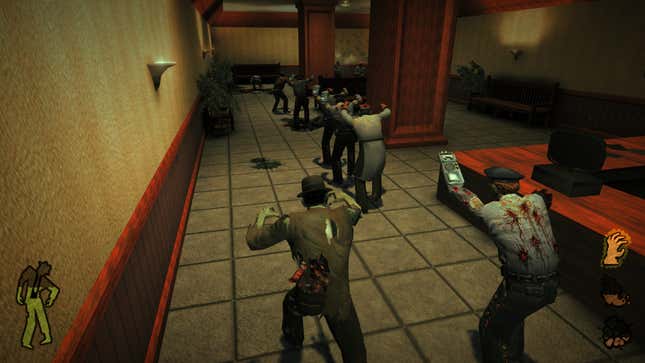
Zombies have been a big part of video games for a long time now. Mostly we kill them in droves. But back in 2005, Stubbs The Zombie shook things up and let you take on the role of a zombie devouring people in a futuristic city. That game is back on modern consoles via a remaster that might be too bare-bones for some.
Stubbs The Zombie was developed by Wideload Games, a company made up of former Bungie devs who left the Halo studio a few years after Microsoft purchased it in 2000. That connection to Bungie is how the studio was able to license the Halo engine for the game, making it one of the only non-Halo games to utilize that engine. Using that tech, the small team at Wideload created Stubbs The Zombie In Rebel Without A Pulse, a bizarre action game about a zombie, Stubbs, who goes around eating brains, creating more zombies, peeing on stuff, and participating in dance battles.
Stubbs wakes up as a zombie in the middle of Punchbowl, a newly built city in the 50s that has big clunky robots, laser guns, and hover cars. Being a newly animated zombie in this metropolis, most of your time is spent doing zombie things, like eating brains and attacking humans. But Stubbs is no ordinary zombie; he has special abilities that he can use after eating enough brains. He tosses his head like a bowling ball and blows up enemies, making them zombies. He can rip his arm off, and players can control the arm like a remote control car. Jump on a human as a hand and you take command of them, letting you use any weapons they might have or allowing you to sneak around areas as a human. It’s rarely useful, but it’s funny.

The bulk of the game is spent doing the same basic thing. Stubbs enters a new area, kills some humans, builds an undead army, helps them spread, kills more humans, and eventually fights a boss or finishes some bigger objective like destroying a dam. While there are some different things sprinkled throughout the game, like some sections involving vehicles and a part where you pee into the city’s water supply, most of your time is spent using the same attacks to kill humans in various empty areas or rooms. What makes this enjoyable is the setting and the zombies you make along the way. Guiding an army of zombies into battle against scientists with plasma pistols while barbershop quartet singers in jetpacks attack from above is a unique experience that only Stubbs The Zombie can offer.
For the remaster, publisher Aspyr Media decided not to change too much. This isn’t a big, fancy remake; the main improvements and changes include a nice 60 fps framerate, achievements, and modern control options like changing inverted sticks. This is basically the original game, just playable on new consoles and running a bit better. While I appreciate that players in 2021 will now be able to easily play Stubbs The Zombie, I also found the lack of improvements disappointing. For example, while I understand not replacing every texture, it’s odd and distracting to see some in-game HUD elements using the original art from the 2005 release, which look fuzzy and pixelated when blown up on a big screen.

Players might have a rough time coming back to Stubbs. Video game design has come a long way since 2005, and many might be frustrated by Stubbs’ infrequent checkpoints, empty rooms, spongey bosses, lack of clear objectives, and repetitive gameplay. Since Stubbs took me about six hours to finish, these drawbacks didn’t mean the game wore out its welcome, which is nice. Shorter games are a trait I miss from the mid-2000s. Remember when games were short? What a time.
Part of me wishes Stubbs The Zombie got a full-on remake, a more polished and modern adventure a la the recent Resident Evil remakes. One of the achievements in the game references a sequel, asking fans to demand one, so perhaps Asypr’s ultimate plan is to build up some excitement for more Stubbs. For now, if you don’t mind some mid-2000s jank, there’s a lot of enjoyment to be found in the short but charming Stubbs The Zombie.
Stubbs The Zombie comes out March 16 on Xbox One, PS4, Switch, and PC. The game can be played on next-gen consoles via backward compatibility.